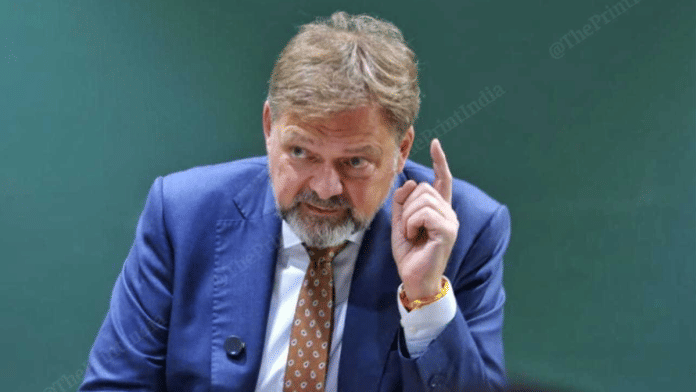New Delhi: German tunnel boring machine maker Herrenknecht is looking to set up its manufacturing units in India, after Chinese customs held up at least three of its machines scheduled for export to the South Asian nation, Germany’s Ambassador to India Philipp Ackermann told ThePrint in an exclusive interaction Monday.
The last of the tunnel boring machines (TBMs) have been dispatched to India from China, Ackermann added.
The delay in the export of the TBMs from Herrenknecht’s Chinese factories has held up key Indian infrastructure projects. The issue has been raised at the highest levels with both the German and Chinese governments by India.
“The tunnel boring machines is an interesting case: So it is clear for political reasons that the Chinese would not really let them out. Now they are out…They are coming in. I think one came a month ago…The last one is coming now,” Ackermann said on the export of the Herrenknecht machines.
The German ambassador added: “Of course the company says that it cannot do business when Chinese customs are not allowing this. They are now setting up shop in India, they are trying to produce here. It is a good example on how to diversify, do not put your eggs in one basket only.”
Last month, Chinese Foreign Minister Wang Yi, during his visit to New Delhi, assured External Affairs Minister S. Jaishankar that Beijing will address three key concerns of India—fertilisers, rare earth elements and tunnel boring machines, as reported by ThePrint.
Herrenknecht manufactured the machines in China for export to India, but has been caught up due to the tensions between New Delhi and Beijing, in particular after the clashes in Galwan in 2020.
“Our specific concerns on restrictive measures on trade and roadblocks to economic cooperation have been taken up with the Chinese side during various high-level exchanges…Both sides have also agreed to explore and resume dialogue mechanisms and exchanges to enhance cooperation while addressing each other’s concerns,” Ministry of External Affairs (MEA) spokesperson Randhir Jaiswal said last week at a press briefing when asked about the export of the TBMs.
In the last few months, ties between India and China have gone through a political thaw, with Prime Minister Narendra Modi meeting Chinese President Xi Jinping twice—in the Russian city of Kazan in October 2024 and the Chinese city of Tianjin last month.
However, the issue of restriction of exports highlighted Beijing’s willingness to leverage its economic strengths in issues of global geopolitics. European countries and Germany in particular have over the last four decades invested heavily in China. The dependence on China for European firms was seen in particular during the COVID-19 pandemic, which led to a number of supply chain disruptions.
Ties between India and Germany have been in an upswing, starting with former Chancellor Olaf Scholz’s tenure, and is expected to continue under the current leadership of Friedrich Merz, the German ambassador highlighted.
Merz, who took over in May, is likely to visit India before the end of this year, Ackermann said, while the German Foreign Minister Johann Wadephul was in New Delhi at the start of September.
At a strategic level, Germany has also looked to expand its defence ties with India, with faster processing of requests, while negotiations are ongoing for the P75(I) submarine project with German firm ThyssenKrupp Marine Systems and Mazagon Dock Shipbuilders.
German mantra of diversification
The economic disruptions due to the dependence on China in turn convinced Berlin of the need to diversify its supply chains over the last four years. The war between Russia and Ukraine and the American administration under President Donald Trump has all added impetus to Berlin engaging heavily with New Delhi, Ackermann highlighted.
“What Germany learned the hard way in the last four years is that you can’t be dependent on one energy provider, on one security provider and one business. I think that is the basis of our rethinking of diversification. Business is China, Security is US and energy is Russia.”
In the last four years, along with the European Union (EU), Berlin has pivoted to strengthen its strategic ties with India. If the COVID-19 pandemic was a turning point in ties between European nations and China, the Russia-Ukraine war disrupted a decades-long energy partnership.
At the end of 2021, Germany depended on Russia for almost half of its natural gas needs, a third of its oil needs and also nearly half of its coal requirements, according to media reports. The full-scale war between Russia and Ukraine, which began on 24 February 2022, when Russian President Vladimir Putin announced a “special military operation” upended the long-standing Berlin-Moscow energy partnership.
While Berlin has taken steps to diversify its energy mix, across the EU, Russia is still a key supplier of natural gas. In the last year, the EU countries combined imported roughly EUR 67.5 billion worth of goods from Russia, primarily energy goods and fertilisers.
Its traditional security partner, the US has also evolved in recent years, particularly under President Trump, who has pivoted American defence away from Europe.
“Therefore, I see the German-India relations are this push, you know, this boost of the German-India relations is basically due to the fact that we have been a little too convenient in many ways…It was very comfortable with the American security, the Russian gas and Chinese manufacturing and that is not the case anymore,” Ackermann said.
(Edited by Gitanjali Das)
Also Read: Germany has decided to defend itself. And its war-making rhetoric can spell doom







A good narrative on diversification by Germany!…